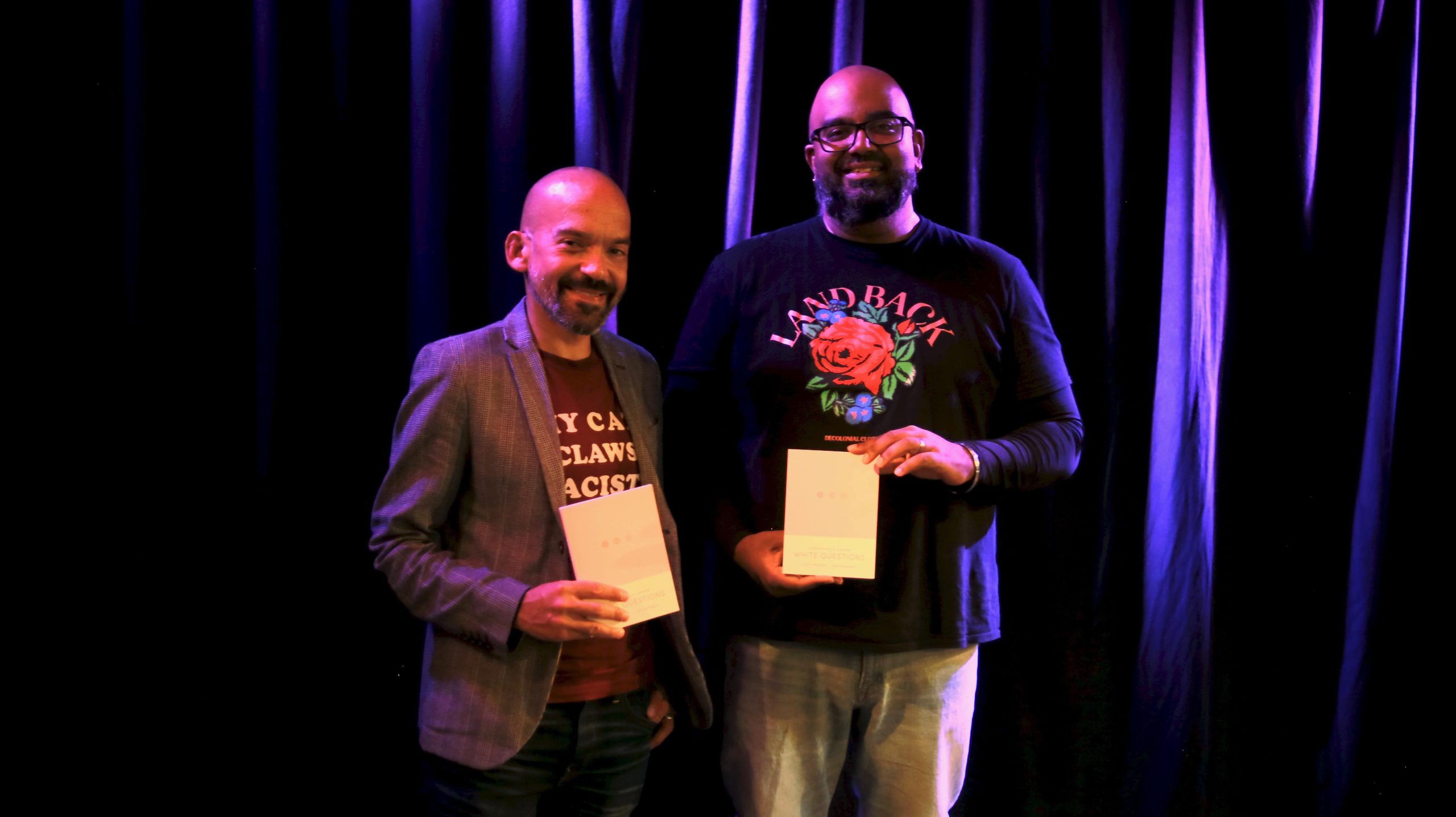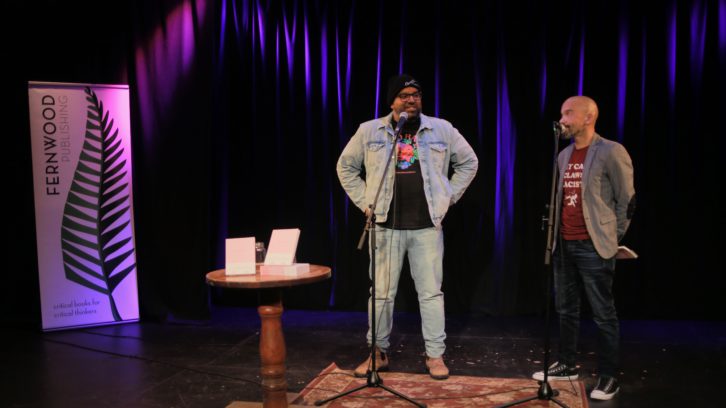Profs’ new book answers frequently asked white questions
YouTube show hosts join forces to create accessible guide for people learning about racial privilege

caption
Ajay Parasram (left) and Alex Khasnabish (right) hold up their new book, Frequently Asked White Questions, at their book launch held at the Bus Stop Theatre on Nov. 8 in Halifax.Halifax professors Ajay Parasram and Alex Khasnabish noticed recurring themes in the questions white people would ask them about race. So they wrote a book to educate people trying to understand anti-racism.
Published by Fernwood Publishing, Frequently Asked White Questions tackles topics such as the differences between cultural appropriation and cultural appreciation, whether it’s possible to be racist towards white people, and how racism relates to other forms of oppression.
The book launch, attended by about 50 people, was held on Tuesday in Halifax.
Khasnabish, a sociology and anthropology professor at Mount Saint Vincent University, specializes in radical politics and social movements. He said the writing process taught him about the importance of empathy in anti-racist work within a white-dominated society.
“It’s pragmatic. Not because white people deserve more, but because that’s where we are located. And I think a lot of white folks who’ve been organized that way are legitimately looking for a different kind of future and a different sort of reality,” he said.
The book compiles answers from the authors’ monthly YouTube show, Safe Space for White Questions, where they invited people to ask them questions about matters of race. The show ran from October 2020 to March 2022.
To Parasram, well-intentioned humour can help people understand issues that might otherwise trigger their defensiveness.
“What really surprises me is how relevant a lot of this stuff for white people is for people of colour as well,” he said.
Parasram sees the book as an attempt to normalize conversations about collective liberation, which involves the anti-racist education of all people regardless of racial background.
“Collective liberation really is the only way to be liberated because until everybody’s free, nobody can be free,” he said.
Parasram also said the book tries to stay true to foundational points of Black feminism.
“We’re not saying anything new in here that people haven’t been talking about for a hundred years,” he said.
Parasram said his students inspired the project. He grew concerned when he noticed how racialized students were being treated differently from white students.
“It was really clear that there’s a double standard that white kids could get away with making all kinds of terrible mistakes and saying awful things in class, and people would excuse it. But when a racialized student said something, they were expected to be a representative of their community,” he said.
Masuma Khan, a former student of Parasram, attended the launch. She said the publication of Frequently Asked White Questions means she doesn’t have to take on unnecessary labour to explain basic things about race to white people.
“I’m not buying it for them. But now I can point them to a resource that I know I can actually trust,” she said.
Khan said the book’s publication made her sentimental given all the racism she had encountered in academia.
“It provides a platform for racialized people to feel validated by other racialized people with intersectional experiences who have had to navigate this,” Khan said. “It just means that there’s some ease after so much struggle. That there’s some healing after so much pain.”
Nailah Tataa was also at the book launch. They wish the money and resources that went into the book would have been redirected to communities of colour.
“We can’t wait for white people to catch up with us. Because if we wait, we will die. Like, this book is great. But again, we’re still centring white people to be like, hey, dip your toes in this! It’s not about dipping your toes,” Tataa said.
Parasram acknowledges that people of colour often have to use their lived experiences to educate white people about racism. He said he was motivated to do this project out of frustration.

caption
Parasram and Khasnabish based their book on their YouTube show Safe Space for White Questions.
Looking ahead
Parasram said he and Khasnabish are always thinking about the “silent listening majority” of people who aren’t committed racists.
Khasnabish said he believes the book might make a difference.
“I just think we need as many oars in the water as possible. And ours may be a very small one, and maybe we’re just paddling in a circle, but it feels like we’re contributing at least a little something to a larger struggle for social justice.”
Parasram and Khasnabish hope to reboot Safe Space for White Questions for a third season or reformat the show for another social media platform.
About the author

Audrey Chan
Audrey (they/them) is a journalism student at the University of King's College. They have a background in Contemporary Studies and Cinema &...
